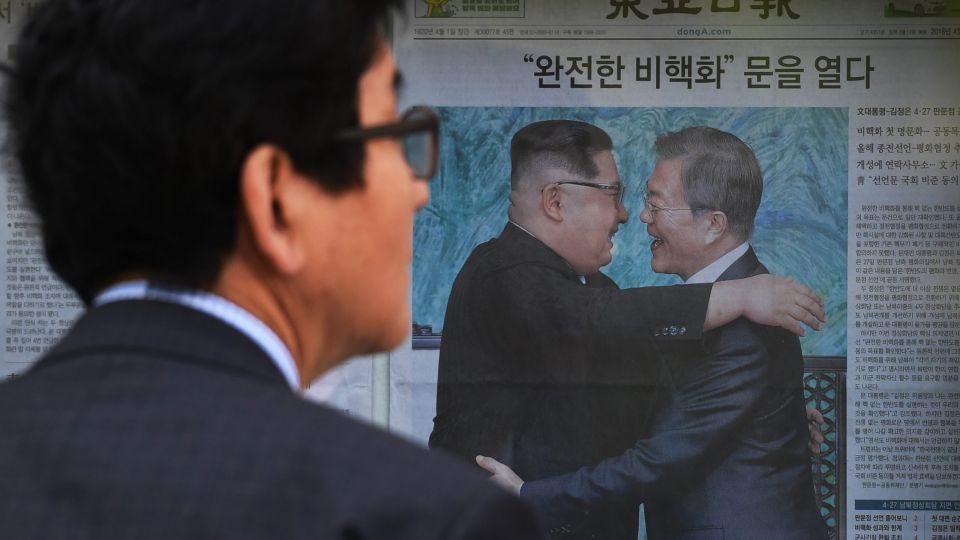April 30, 2018
A recap of the concrete actions, the possible future actions and global reactions to the Korean Summit.
Friday’s Korea Summit was historic for many reasons. It was the first time since the Korean War that a North Korean leader crossed over into the South and positive signs emerged that Pyongyang were interested in the denuclearization of the Korean peninsula.
The Panmunjom Declaration following the summit between South Korean President Moon Jae-in and North Korean leader Kim Jong-un, jointly called for “complete denuclearization” of the Korean Peninsula and agreed to halt all hostile acts against each other, as well as seek a formal end to the 1950-53 Korean War and a peace regime among other things.
With so much going on, we have compiled a list of actions, possible actions and reactions to the summit to make following everything easier.
Concrete Action
North Korea will unify its time zone with South Korea’s starting this weekend in a bid to promote the two Koreas’ reconciliation and unity, the country’s state media said Monday.
South Korean President Moon Jae-in is stepping up efforts for US and Japan collaborations on North Korean issues, in the follow up to his summit meeting. Moon spoke with US President Donald Trump late Saturday, and with Japanese Prime Minister Shinzo Abe on Sunday.
The meeting has also brought about goodwill from the South Korean public with over 60 per cent stating that they trust North Korea’s willingness for peace and denuclearization, according to the Korea Herald.
Possible and Future Action
In addition to the concrete measures passed at the summit, both sides agreed to numerous actions in the short and medium term that could see fruition by year’s end.
North Korea said that it will shut down its nuclear weapons testing facility in May, and allow inspection by South Korean and US experts and media. Kim denied speculations that the decision to shut the facility down was prompted by structural damages, saying that there are two intact tunnels at the site.
The two Koreas’ leaders pledged to restore now-defunct railways and roads during the summit including the Gyeongui Line and East Coast Line. The former is between Seoul and Sinuiju, while the latter had connected the South’s coastal city of Busan and Wonsan of the North.
Both countries also agreed to closer economic cooperation with South Korean media speculating that the North’s abundance in rare earth minerals a possible bright spot for cooperation.
Reaction
The summit has prompted reactions from international leaders and observers with many expressing optimism that peace could be achieved.
US President Donald Trump hailed the historic summit for moving forward inter-Korean ties and while taking credit for their taking place.
“KOREAN WAR TO END! The United States, and all of its GREAT people, should be very proud of what is now taking place in Korea!” the president tweeted.
Trump is due to meet with Kim in a separate summit and his administration have also reacted cautiously optimistic after Friday’s talks.
US Secretary of State Mike Pompeo told reporters that there was a ‘real opportunity’ for progress after the summit.
“The United States has an obligation to engage in diplomacy with North Korea to find a peaceful solution to its nuclear weapons issue,” he said.
Meanwhile, US National Security Adviser John Bolton said that the United States is considering using the model of Libya’s denuclearization in upcoming negotiations with the North. The Libya model calls for North Korea to fully dismantle its nuclear program before receiving any concessions from the US in return.
“I think that the maximum pressure campaign that the Trump administration has put on North Korea has, along with the political-military pressure, has brought us to this point,” Bolton said, noting that global leaders, including South Korean President Moon Jae-in, have all acknowledged the US’ role. “Relieving that pressure isn’t going to make negotiation easier, it could make it harder.”
Chinese Foreign Minister Wang Yi will visit North Korea this week ahead of a historic summit planned between the North and the United States, the Chinese foreign ministry said Monday.
In Pyongyang, Wang is likely to be briefed on the results of the Moon-Kim summit and discuss strategies for the upcoming summit between Kim and Trump.
His visit may also involve discussion on Chinese President Xi Jinping’s North Korea visit, which is reported to take place in early June, presumably following the North Korea-US summit.
South Korean President Moon Jae-in spoke privately with Russian President Vladimir Putin and credited Russia’s support for the success of the summit. Moon called for Putin’s continued backing for Seoul’s diplomacy with North Korea while Putin congratulated Moon for the talks. Both sides said that trilateral economic cooperation with North Korea was necessary to promote peace.
Finally, Japan has conveyed a desire to hold its own summit with North Korea following the success of the talks with the South.
South Korean President Moon Jae-in told Abe in their telephone talks Sunday that Kim expressed his willingness to hold a dialogue with Japan during an inter-Korean summit on Friday between Moon and Kim.
The Abe administration hopes a Tokyo-Pyongyang summit will provide an opportunity to make progress toward resolving the issue of the North’s abductions of Japanese nationals in the 1970s and 1980s, as well as the North’s nuclear and missile programs.


